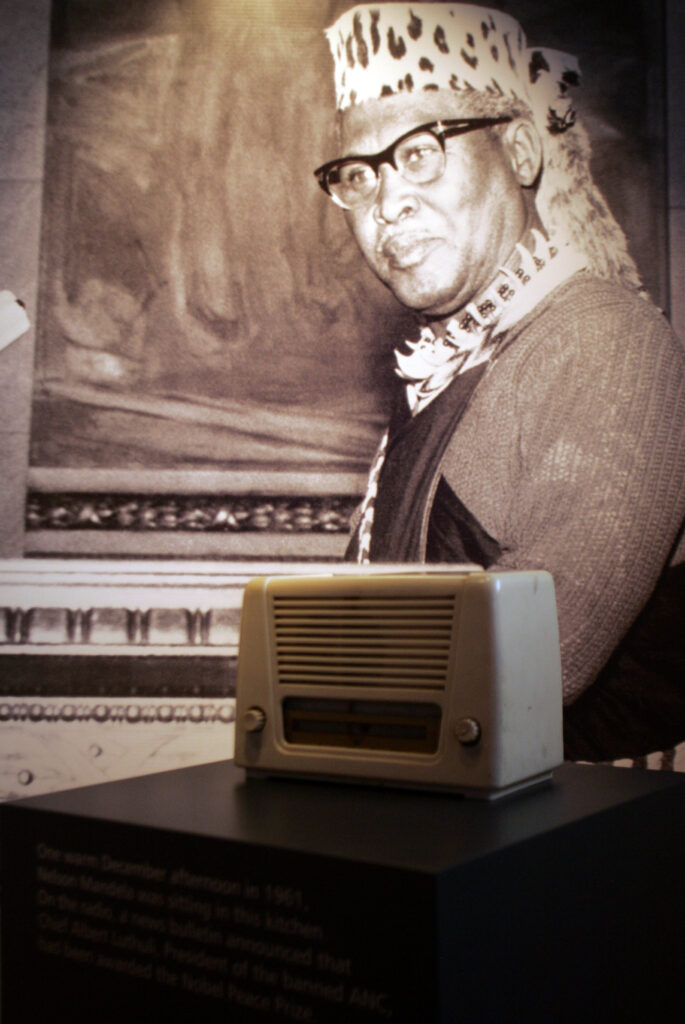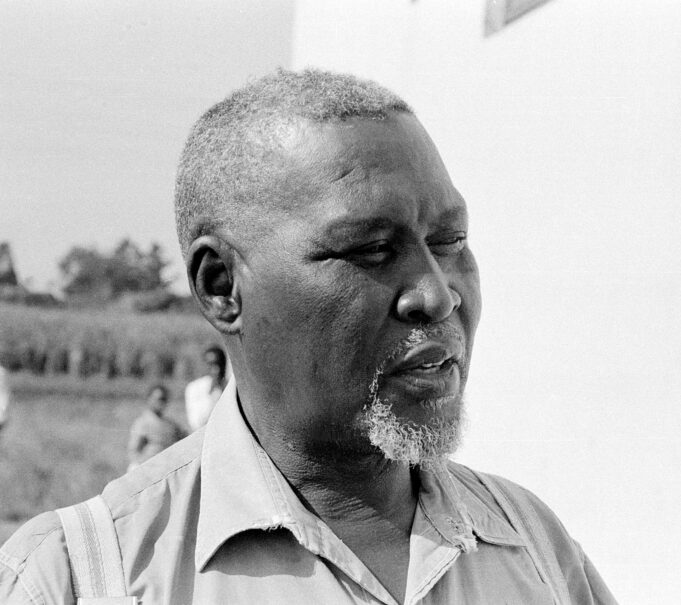Many believe Albert Luthuli was silenced because he was using a global platform to highlight the horrors of Apartheid
by Kubendran Chetty – RT.com
Chief Albert Luthuli, renowned anti-Apartheid activist and Africa’s first Nobel Peace Prize laureate, died in 1967 after being struck by a train. His death was ruled accidental, but in May this year, 57 years later, South Africa’s national prosecuting authority reopened the inquest, saying there are suspicions regarding the circumstances of his death.
South Africa under colonial rule
The country had been under colonial rule for almost 250 years by the time Luthuli was born in 1898, and regardless of whether it was the Netherlands (1652-1795 and 1803-1806) or Great Britain (1795-1803 and 1806-1961), the majority of Luthuli’s countrymen were treated as second class citizens for decades.

Successive colonists were attracted by the lure of the mineral revolution that was taking place in the country. The greed of this desire to possess the country’s mineral wealth would see them enact various phases of dispossession and the exclusion of Black people from power in the quest for wealth.
The first signs of the considerable mineral wealth emerged in 1867 when South Africa’s diamond mining industry was established, with diamonds being discovered near Kimberley in what is today known as the Northern Cape.
The Kimberley diamond fields, and later discoveries in Gauteng, the Free State, and along the Atlantic coast emerged as major sources of gem-quality diamonds, securing South Africa’s position as the world’s leading producer by the mid-20th century.
Later, the discovery of the Witwatersrand goldfields in 1886 was a turning point in South Africa’s history. The demand for franchise rights for English-speaking immigrants working on the new goldfields was the pretext Britain used to go to war with the Transvaal and Orange Free State in 1899.
White government
South Africa became a Union with its own White government in 1910, but the country was still regarded as a colony of Britain until 1961. Driven by Western exploitation and the desire for its considerable mineral wealth, it appeared that little attention was being paid to the yoke of oppression that was being placed on the citizens of the country.
Luthuli was still a teenager when in 1913, the Land Act was introduced to prevent Black people, except those living in the Cape Province (now the Western Cape), from buying land outside reserves.
When the National Party (NP) took power in 1948, marking the beginning of White Afrikaner rule under the scrutiny of Britain, these laws designed to exclude Black people from the economy started to take sinister shape as they covered the entire country.
The policy of Apartheid was adopted by the NP as soon as they assumed power, and this was followed two years later by the Group Areas Act, which was passed to segregate Blacks and Whites and saw the Communist Party banned.
By 1960, the oppression of the Apartheid government had gained steam, culminating in the deaths of 70 Black demonstrators killed at Sharpeville. The news of this atrocity reached the world and triggered international outrage. The African National Congress (ANC), Africa’s oldest liberation organization formed in 1912, was banned soon thereafter.
Teacher and chief
Albert Luthuli was born into a religious family, and his childhood was like many of his peers, with a notable exception—he desired to be educated despite the colonial restrictions on access to learning and he started to become consciously aware of his religion.
He completed a teaching course in Pietermaritzburg, KwaZulu-Natal and was later confirmed in the Methodist Church and became a lay preacher.
In 1920, he received a government bursary to attend a higher teachers’ training course at Adams College, and subsequently joined the college as a teacher, where he saw firsthand the struggles of the working class.
In 1935, Luthuli was called upon to become chief in his ancestral village of Groutville in KwaZulu-Natal. For 17 years, he immersed himself in the local problems of his people, adjudicating and mediating local quarrels and organizing African cane growers to guard their own interests.
Through minor clashes with White authority, Luthuli had his first direct experience with African political predicaments. Travel outside South Africa also widened his perspective during this period.
Conflict with the authorities
It was at this stage that Luthuli’s political involvement started to accelerate as he became more involved with the ANC and he became the provincial chairperson of the party in 1951. At 54, he was a late bloomer in politics.
His public support for the 1952 Defiance Campaign, which saw thousands of people peacefully refuse to obey Apartheid laws of segregation and subjugation, brought him into direct conflict with the South African government, and after refusing to resign from the ANC, he was dismissed from his post as chief in November 1952.
At the annual ANC conference in December 1952, Luthuli was elected president-general by a large majority and he was subsequently banned by the Apartheid government from publicly addressing supporters.
In 1960, Luthuli was awarded the Nobel Peace Prize, but the South African authorities said he was banned and refused to allow him to travel to Oslo, Sweden, to accept the award. It was only the following year, with cajoling from the Peace Prize committee, that the Apartheid authorities finally relented and allowed him and his wife, Nokukhanya, to travel to receive it.
Nobel Peace Prize
Luthuli was acutely aware of the global platform his speech would give him and the millions of South Africans who had to endure countless horrors and deprivations at the hands of the Apartheid government, the very reason that the government had obstinately refused him permission to travel before finally relenting.
“As you may have heard, when the South African Minister of Interior announced that subject to a number of rather unusual conditions, I would be permitted to come to Oslo for this occasion, conditions, Mr. President, made me literally to continue (to be) a bad man in the free Europe. He expressed the view that I did not deserve the Nobel Peace Prize for 1960.”
Unbowed and defiant, Luthuli used the opportunity to share with a global audience the reality of the situation in a country, where censorship hid the atrocities that were being committed away from the global eye.
“I recognize, however, that in my country, South Africa, the spirit of peace is subject to some of the severest tensions known to men. Yes, it is idle to speak of our country as being in peace, because there can be no peace in any part of the world where there are people oppressed.
For that reason, South Africa has been, and continues to be, the focus of world attention. I therefore regard this award as a recognition of the sacrifice made by many of all races, particularly the African people, who have endured and suffered so much for so long.”
Support from Martin Luther King Jr.
With his Nobel Peace Prize acceptance speech, Luthuli achieved what he had set out to do—bring worldwide attention to the plight of the majority of the people in South Africa.
On October 22, 1962, University of Glasgow students elected Luthuli as lord rector in recognition of his “dignity and restraint,” and his adherence to non-violence saw him supported by civil rights activist Martin Luther King Jr., who commended Luthuli’s reputation and spoke of his admiration for Luthuli’s “dedication to the cause of freedom and dignity.”
In September 1962, King and Luthuli issued the Appeal For Action Against Apartheid organized by the American Committee on Africa, which boosted solidarity between the anti-Apartheid and civil rights movements and urged Americans to protest Apartheid through non-violent measures such as boycotts.
The Apartheid government responded to Luthuli’s increasingly global prominence by tightening the noose on his freedoms, and in 1964, imposed a banning order that was so severe that he could not even travel to the nearest town a few kilometers away from his house.
John Vorster, then-minister of justice, said Luthuli’s activism advanced communism, and he cautioned him against publishing any statements, making contact with banned individuals, or addressing gatherings.
Quest for justice
Luthuli, by then a renowned anti-Apartheid activist, died on July 21, 1967. The official report stated that he was hit by a train near Gledthrow station, Groutville, KwaZulu-Natal, but his family and activists have long cast doubts on the White-minority government’s version of his death.
Its inquest found that the Nobel laureate had died in an accident after being hit by a train as he was walking by a railway line near his home in the KwaZulu-Natal province. But campaigners suspected that the regime killed him and covered it up by claiming he died of a fractured skull after being struck by a train.
In September 1967, an inquest held by the Apartheid regime at a magistrates’ court found the evidence “did not disclose any criminal culpability on the part of the South African Railways and anyone else.”
In May this year, the country’s justice minister at the time, Ronald Lamola, announced that a new inquest will be held into the mysterious death of Luthuli. In a statement, Lamola said a new inquest would “open very real wounds,” but “the interest of justice can never be bound by time.”
Lamola said he acted on the recommendation of the National Prosecuting Authority (NPA), which cited a mathematical and scientific report as saying that it was highly unlikely that Luthuli was struck by a train and died because of this.
While details of the new inquest have yet to be made public, it is understood that experts undertook an historic forensic investigation and reconstructed the crime scene, finding that there were significant suspicions around how reports of his cause of death had been captured.
Luthuli’s death—at the height of his international acclaim—did not lead to the dismantling of the Apartheid system that he had fought hard to remove.
Instead, the system profited and persevered for another 23 years before his beloved ANC was unbanned in 1990 and Nelson Mandela, who would later become the country’s first democratically elected president, was released from prison.
Luthuli’s family has maintained since his death that the international renown he used as a platform to speak out against the ravages of oppression was the reason behind his death.
Luthuli was bringing international attention to the cause of freedom in South Africa and stood in the way of those opposed to democracy and Black majority rule. Therefore, was he stopped?
Kubendran Chetty is a South African-based international affairs commentator













